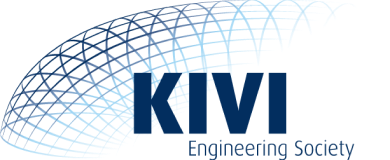
Sustainable food production systems and resilience agriculture practices
Short report on KIVI Kring Caribbean – Aruba activity titled “Sustainable Food Production Systems and resilient agriculture practices”
You can find the sheets of the presentation under 'Documenten'
In his introductory words Leopoldo Henriquez, member of the Board of the KIVI Kring Caribbean – Aruba, referred to the objectives of the Royal Netherlands Society of Engineers (KIVI), which is a Dutch engineers’ society having about 17000 members. The main objective is to offer a platform where engineers can update their knowledge but especially to exchange their expertise and experience by meeting other engineers. The presentation on SDG 2 - goal of the Agenda 2030 of United Nations, being Zero Hunger, is focusing on the need of (innovative) technology to realize the target of sustainable food production systems and resilient agriculture practices.
During the Covid pandemic it became very clear that the supply of food products to Small Island Development States (SID's) in the Caribbean like Aruba was clearly a threat. In particular the provision of good quality and fresh food was at stake and not sustainable. Food security is part of the United Nations Agenda 2030 which is laid down in the Sustainable Development Goal number 2. The SDG goal number 2 is defined to be to end hunger or Zero Hunger by targeting several issues like to ensure access by all people to safe, nutritious and sufficient food, to end all forms of malnutrition and to ensure sustainable food production systems and implement resilience agriculture practices.
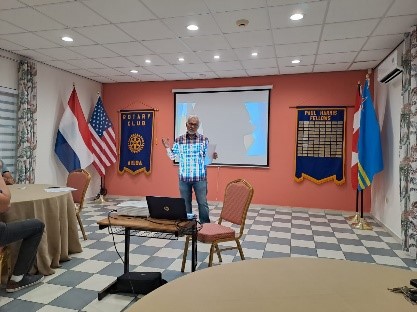
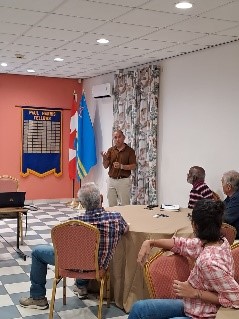
As chair of the United Farmers Aruba (UFA) dr. Gregory Fun A Fat, a pharmacist, entrepreneur and environmentalist, presented the mission of UFA to promote local farm products through a collaboration of local Aruban producers and consumers. Its vision is a community of farmers working together to support each other and the island by successfully producing high quality sustainable farm products.
Dr. Fun A Fat is a firm believer that food production on Aruba will be based on the circular economy principles since a linear one is not sustainable. Images showing activities like these showed these applications already in place a long time ago but due to several circumstances like, too expensive water and high energy prices, these were not sustainable at that time. A turnaround in 2013 demonstrated that local food production is possible on a large scale. Since then about 5 enterprises were established which produce nowadays only 1% of the total food needed on Aruba.
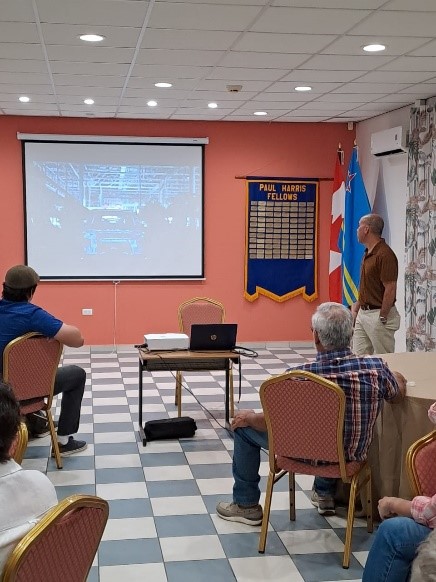
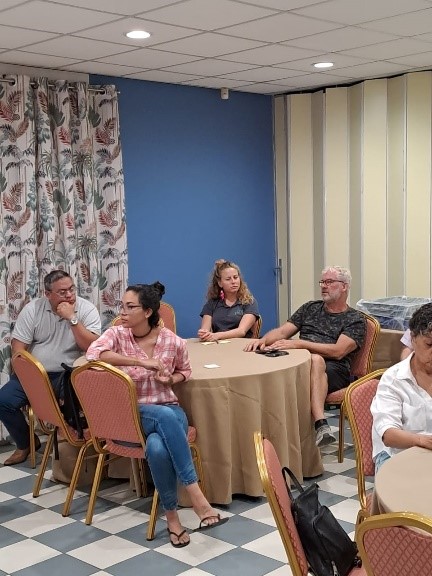
Dr. Fun A Fat stated that to supply whole Aruba with sufficient food, for food production an area twice as big as Aruba is needed. To have a better outlook on Aruba’s future on agriculture, reliable data is needed and these are missing, i.e. data on available acreage for food production, local weather, types of soil etc. Another issue is that the price of electricity is too high. The water issue has been solved so far, there is a special price for water for the agricultural sector.
According to Dr. Fun A Fat we have to rely on technology to develop the agriculture industry here on Aruba. For example vertical farming is a solution for the lack of area. Cultivation of crops in buildings, in containers or warehouses (vertical farming) could also offer advantages. The plants are grown using nutrients and water and LED lights that mimic natural sun light, while using robots or drones to manage it. This idea is shown in one of the slides of the presentation which can be found on the KIVI Kring Caribbean – Aruba webpage (Kring Caribbean | KIVI ) or https://youtu.be/0s4YwzbUzhw
KIVI Kring Caribbean – Aruba thanked Dr. Gregory Fun A Fat for his excellent presentation.
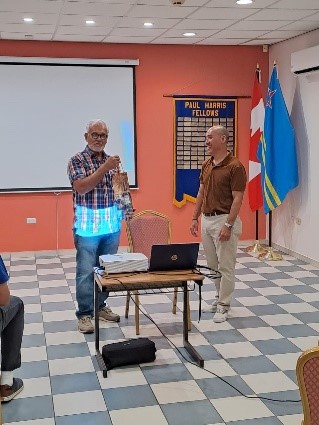
Next activity
The following activity will be on the 30th of March 2023 and the theme is “Artificial Intelligence for engineers”.
KIVI KRING CARIBBEAN – ARUBA organizes its next activity on Sustainable food production systems and resilience agriculture practices
Within the framework of the United Nations Agenda 2030 the Sustainable Development Goal (SDG) number 2 is very important. Looking back to the experience due to the COVID pandemic food security and resilience has been recognized to be very important. The SDG goal number 2 is defined to be to end hunger or Zero Hunger by targeting several issues like to ensure access by all people to safe, nutritious and sufficient food, to end all forms of malnutrition and to ensure sustainable food production systems and implement resilience agriculture practices.


United Farmers Aruba (UFA) and Dr. Gregory Fung A Fat
Dr. Gregory Fun A Fat, Pharmacist, Entrepreneur and Environmentalist, being chair of the UFA is a big promotor on Aruba in producing local food in a sustainable way. Technology is one of the key elements to reach the goal of sustainable food production and resilience agriculture practices. During his presentation Dr. Fung A Fat will give an overview of technology currently already in place together with an outlook of potential food production technology which are feasible to implement on Aruba.


MOU’s signed by UFA with the Government of Aruba and the University of Aruba
KIVI KRING Caribbean invites all engineers to attend this presentation to increase knowledge on innovative technology to produce qualitative food for Aruba. This activity will take place at the YMCA location at Calabasstraat 1 Dakota on Thursday February 23, 2023 at 6:30 to 7:30 p.m. followed by a network meeting from 7:30 – 9:00 p.m. while enjoying a drink and a snack.
An entrance fee of 15 AWG florins is charged to KIVI members to cover the costs while non-members are charged 20 AWG fls. There is a free entrance for students at the University of Aruba while the entrance fee for the PhD candidates is10 AWG fls.
You can register via the website.
